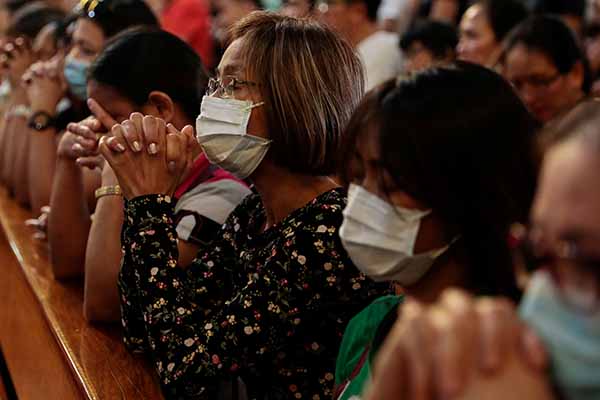
CHINATOWN — Although New York City has the largest Chinese population in any city in the world outside China, no one in the city has been confirmed with the coronavirus. The disease started in the central Chinese city of Wuhan at the end of last year and has spread throughout the world.
As of Feb. 23, the virus has claimed the lives of 2,445 people. There has been 78,811 reported cases, most of them in China, according to the World Health Organization.
Still, despite no reported cases in New York, the disease has struck fear in the city’s three “Chinatowns” — the official Chinatown in Manhattan; and Flushing, Queens, and Sunset Park, Brooklyn. That anxiety has depressed businesses in those neighborhoods and prompted xenophobic attacks on people of Asian descent.
Global hysteria over the severe acute respiratory syndrome (SAR) caused by the new coronavirus — officially called COVID-19 — is affecting many of New York’s Chinese-owned and operated businesses, many of whom are suffering the impact over fears of the outbreak.
The virus started in Wuhan, about 500 miles west of Shanghai, China, and until now, more than 2,100 people around the world have died, according to CNN. All but eight deaths occurred in mainland China, the majority in the epicenter of the outbreak, in central Hubei province.
Local business owners expressed their growing concerns.
“We have been severely affected by the coronavirus. Frankly, the business has been gangbusters for the past year, and it dropped 40 percent in the past week,” James Tierney Tang, who owns Hwa Yuan restaurant in Chinatown, told New York Magazine in early February.
Tourism Economics predicts a 28 percent decrease in tourism to the U.S. from China this year, or about $5.8 billion less in spending. Coronavirus is expected to cost the travel industry more than $10 billion over the next four years, according to Business Insider.
“Business owners are telling us that revenues are down 40 percent in Chinatown,” Gregg Bishop, commissioner of the Department of Small Business Services, told CNBC. “Consumers should not be afraid to go to Chinatowns across cities and support small businesses.”
“I want to tell people it’s okay because there’s no one with the virus in New York,” said one business owner in Flushing, who is from Wuhan.
“In general, my business has been slow for the past week,” Chi Vy Ngo, General Manager of New York Bo Ky Restaurant, echoed.
City councilwoman Margaret S. Chin, who represents District 1 in lower Manhattan, is encouraging people to support Chinese businesses.
“Sadly we’ve been seeing Asian New Yorkers and small businesses punished for the anxieties caused by the coronavirus,” said Chin in a statement. “We are committed to turning crisis into opportunity … to show love to Chinatown and defy the growing ignorance and fearmongering. I encourage New Yorkers to show their solidarity and visit their local Chinatown restaurants and shops.”
Meanwhile, coronavirus fears have also prompted xenophobic attacks.
“When epidemics happen, people look for others to blame,” said Bishop Nicholas DiMarzio, condemning these attacks at a Feb. 16 Mass at St. Michael’s in Flushing with the Chinese community. “The Chinese people are here in great numbers. We want to take that burden from them.”
The majority of New York’s Chinese immigrants live in the Diocese of Brooklyn, nearly split between Brooklyn and Queens.
Bishop DiMarzio said that a pastoral letter will be released on Ash Wednesday, hoping to give strength and encouragement to the shaken community.
New York’s own Guardian Angels are also helping to fight the xenophobic attacks. They have physically intervened in Chinatown’s Canal Street subway station, and have stopped teenagers harassing elderly Asians.
The group’s presence is both a “relief” to some and “shocking” to others, mainly because many Chinese communities don’t know what to do, Sliwa said.
“You see it in people’s eyes; [the] fear, fright, hysteria and hype. This leads to confrontations and harassment,” he said. Sliwa would like to recruit more Chinese-speaking Guardian Angels to help combat xenophobia and establish trust.
“The idea is to recruit Chinese [people] themselves to help with these patrols, since they speak the language, especially during coronavirus time,” he said.
“I don’t see this going away anytime soon. The longer this is on the news, the more fear, fright and hysteria will go around. People will start looking at Asian people as if they’re a disease.”
Father John E. Vesey, the pastor of St. Michael’s Church in Flushing, the epicenter of the Chinese community in the diocese, expressed his concerns about Chinese people.
“The biggest concern is the growth of the virus, and the fear of the people. I have never seen people affected so much for anything, like the fear of the coronavirus,” Father Vesey said.
“[Flushing] is the center of cuisine for China, but people are staying home. You could see it in our empty streets … They have quarantined themselves out of fear.”
But Father Kangqiang (Joseph) Lu, who leads the Chinese ministry at Our Lady of Perpetual Help in Sunset Park, said it’s been business “as usual” at his parish. Parishioners aren’t wearing masks, and he hasn’t heard of any incidents.
Unlike the situation in Hong Kong, where public Masses have been cancelled for coronavirus safety reasons, there’s been no need to cancel services at Our Lady of Perpetual Help.
“It’s sad, but it’s also dangerous … We would reduce Mass too if it was a problem here,” Father Lu said. “For us, we must continue to have faith, to trust in God, and He will [keep everyone] safe and healthy. We must pray for the sick.”
